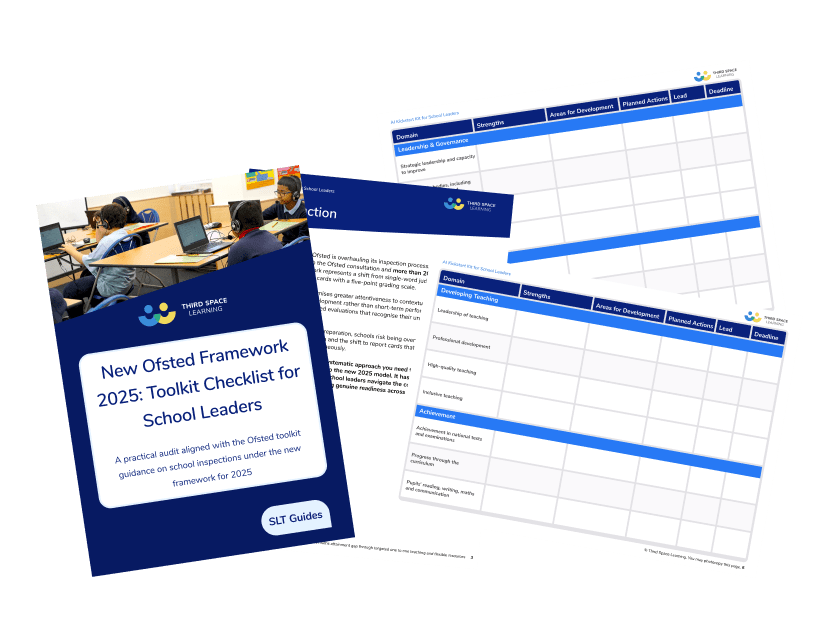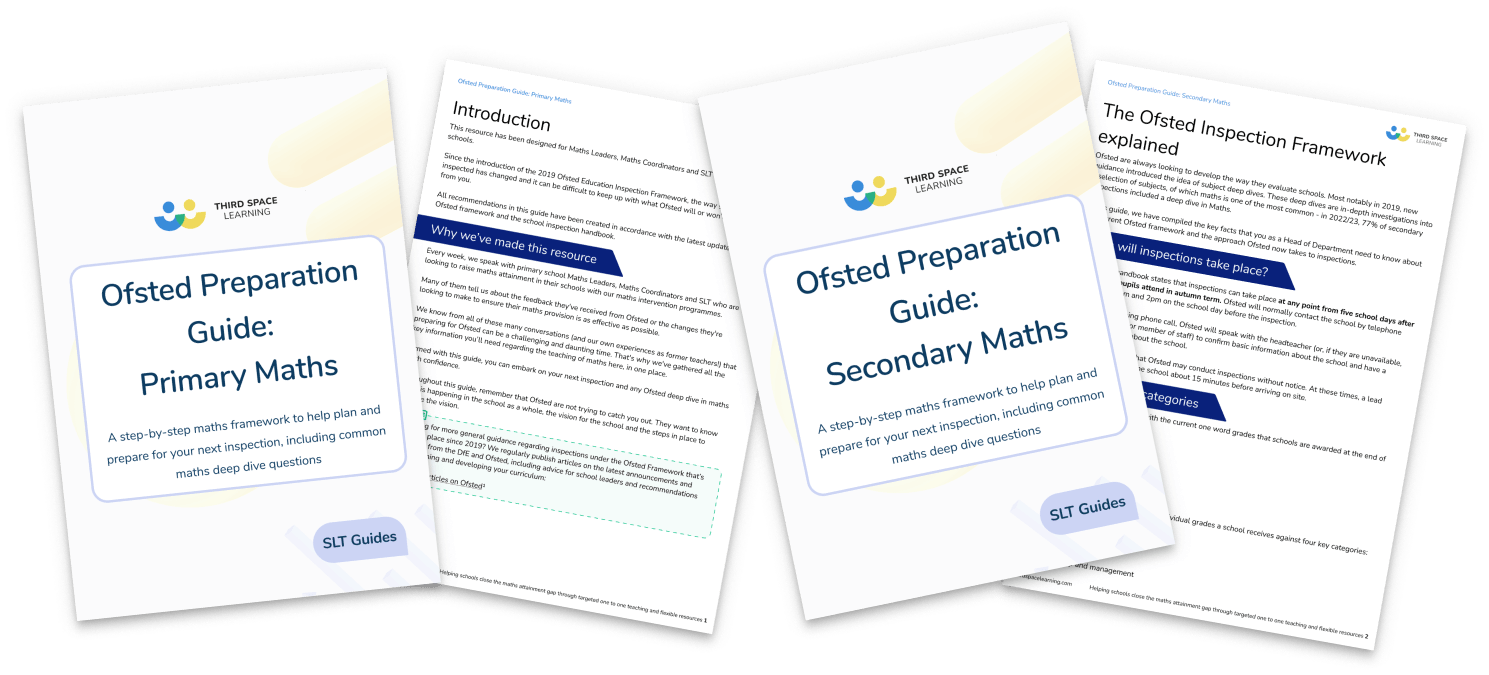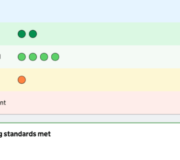New Ofsted Framework 2019: Revised Summary Post Consultation
This article was originally published on 17th January 2019. Ofsted has recently released its new Ofsted framework 2025.
Here is your summary of the new Ofsted Inspection Framework 2019 revised to take account of the changes following the consultation.
Together with Aidan Severs @thatboycanteach we have pored over 100s of pages of information and the results of the consultation exercise to give you a clear summary for school leaders and governors as to what’s in the Ofsted Inspection Handbook and what you can expect from your next inspection!
We know how busy it can be when working in a primary school, so to speed up your read, we’ve broken the blog down by sections, each of them clickable, so find the piece you are most interested in and get reading!
- What are the main changes in the Ofsted framework?
- When will an Ofsted inspection take place?
- New key judgement categories
- Quality of education
- Intent – what inspectors will be looking for
- How intent will be judged
- Implementation – what inspectors will be looking for
- How implementation will be judged
- Impact – what Ofsted inspectors will be looking for
- How impact will be judged
- Quality of education summarised
- Behaviour and attitudes – what inspectors will be looking for
- How behaviour and attitudes will be judged
- Personal development – what inspectors will be looking for
- How personal development will be judged
- Leadership and management – what inspectors will be looking for and how it will be judged
- Increased focus on reducing workload
- Change in how Ofsted wish to be perceived
- Inspections will focus on distinct phases or providers of specialist education
- Amendments to independent schools inspections by Ofsted
- What actions should you now take?
Ofsted Preparation Guides
Prepare for your next inspection with this step-by-step math framework. Includes checklists and questions for an Ofsted deep dive in math.
Download Free Now!What are the main changes in the Ofsted framework?
Here are the 5 headline changes to the Ofsted Inspection Framework:
- Inspection timings have changed but the initial suggestion that Ofsted could arrive within 2.5 hours has been removed;
- There’s no getting away from the Ofsted grades; they stay the same: outstanding, good, requires improvement or inadequate;
- The judgement categories have been completed revised and will now cover: Quality of Education (this is a big one!), Behaviour and Attitudes, Personal Development, Leadership and Management;
- Some key themes emerge (none of which will be a surprise for those who read our previous blog based on Amanda Spielman’s October speech: reducing workload for teachers, an emphasis on good character and resilience among pupils, tackling off-rolling, and of course a broad, well-balanced knowledge-rich curriculum;
- Despite what some have said, we’re not sure from the revised framework that Ofsted inspectors will be ‘ignoring’ data, merely that they will look to understand the purpose and usefulness of internal pupil data.
Bonus fact: Ofsted appear to be listening…there were in the end 15,000 responses to the consultation!
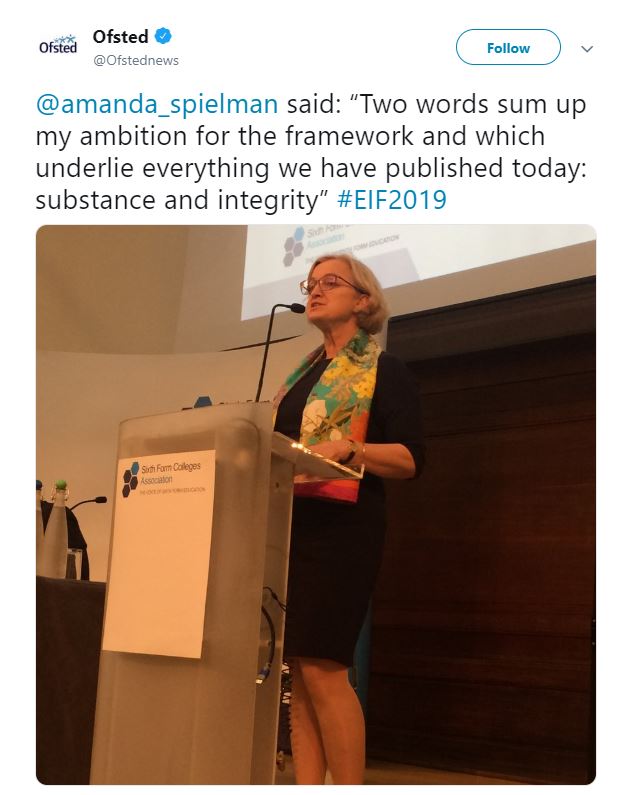
There are two types of Ofsted inspections carried out routinely. As of September 2022, the terminology for these has changed slightly.
- Graded inspections (previously section 5)
- Ungraded inspections (previously section 8)
And now those changes to the Ofsted Inspection Framework in detail…
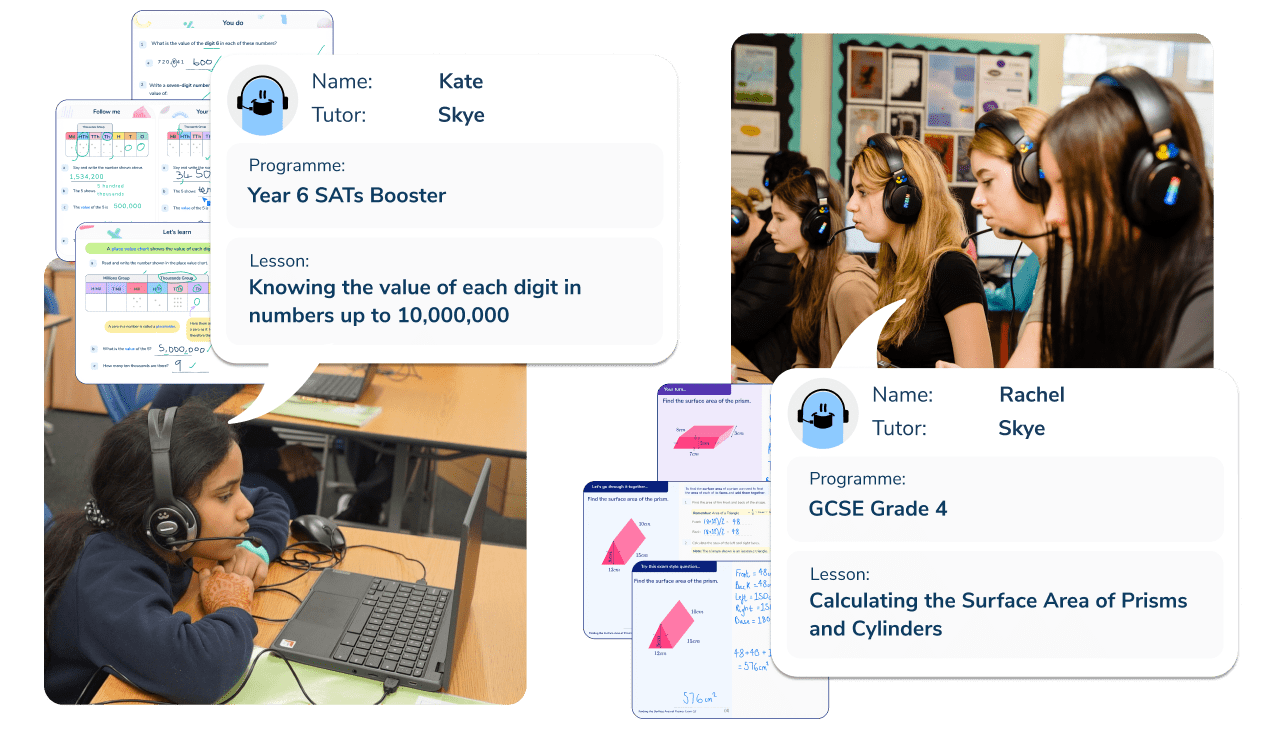
Meet Skye, the voice-based AI tutor making maths success possible for every student.
Built by teachers and maths experts, Skye uses the same pedagogy, curriculum and lesson structure as our traditional tutoring.
But, with more flexibility and a lower cost, schools can scale online maths tutoring to support every student who needs it.
Watch Skye in actionWhen will an Ofsted inspection take place?
With regards to the ‘when’ of an Ofsted inspection, the handbooks shed some light:
- Inspection can take place at any point from five school days after the first day pupils attend that term.
- Notably, the length of time a Section 8 ‘short inspection’ is to be lengthened to 2 days, rather than 1 day, to ensure ‘good’ schools are ‘good’ within the new framework. However in response to the consultation inspectors will continue to be on site for only one day for section 8 inspections of the smallest schools (with 150 or fewer pupils).
- The draft framework included proposals that the lead inspector would have an on-site conversation with school leaders and would complete certain preparations on-site. This has since been dropped due to objections. Instead there will be a 90 minute phone call between the lead inspector or their nominated delegate the day before inspection begins.
However, it also clarifies that ‘Ofsted may conduct inspections without notice. When this happens, the lead inspector will normally telephone the school about 15 minutes before arriving on site.’
New key judgement categories
Whilst schools will still be graded based on the usual Ofsted ratings of outstanding, good, requires improvement or inadequate, it is against quite different criteria that they will be judged.
The most obvious changes are the removal of a specific category for outcomes and introduction of the broader category ‘quality of education’.
The four Ofsted inspection categories inspectors judge against the Ofsted grade descriptors are:
- Quality of education
- Behaviour and attitudes
- Personal development
- Leadership and management
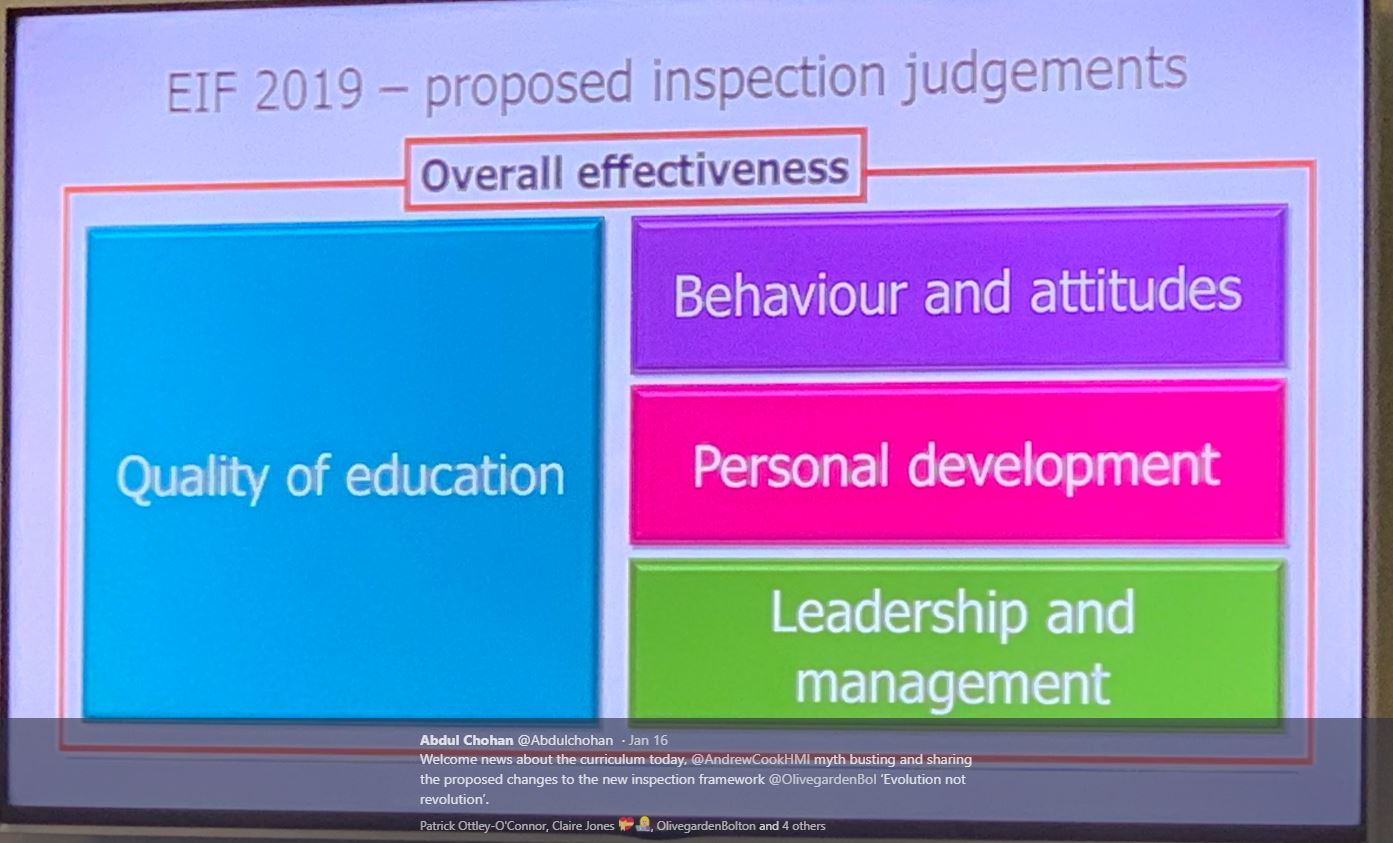
Let’s look at the four new categories, exploring both what the inspectors will be looking for, and how they intend to make their judgements:
Quality of education
In this category are the three ‘I’s: Intent, Implementation, Impact. These three act as subcategories and will not be graded separately. This is the category that is probably going to cause the most interest in the new framework and requires some time to familiarise oneself with.
Intent – what inspectors will be looking for
Here the focus is on the curriculum and the aspirations schools have for their learners (for the sake of expediency this is now Ofsted’s catch-all term for children, pupils, students, apprentices, trainees and adult learners).
Under the new framework, schools should have high and equal expectations, providing an ambitious curriculum which is studied by all.
There appears to be an emphasis on the curriculum being knowledge-rich; however, the handbook insists strongly that ‘this must not be reduced to, or confused with, simply memorising facts. Inspectors will be alert to unnecessary or excessive attempts to simply prompt pupils to learn glossaries or long lists of disconnected facts’.
The other main aspect of the curriculum is that it must deliver cultural capital defined in the handbook as ‘the essential knowledge that pupils need to be educated citizens, introducing them to the best that has been thought and said and helping to engender an appreciation of human creativity and achievement.’
However, there is also mention of the inclusion of skills teaching within the curriculum, particularly regarding preparation for both future learning and employment.
A key message that rings loud and clear throughout the documents is that the curriculum:
- Must be broad and balanced;
- Should provide a wide range of subjects;
- Should have an emphasis should be on how coherent and well sequenced it is, with knowledge, skills and cultural capital all appearing to play a part in this.
How intent will be judged
In the handbook, it is made explicit that ‘Ofsted will judge schools that take radically different approaches to the curriculum fairly. They will assess a school’s curriculum favourably when leaders have built a curriculum with appropriate coverage, content, structure and sequencing and implemented it effectively.’
Inspectors will draw evidence about leaders’ curriculum intent principally from discussion with senior and subject leaders focusing on endpoints, specific and appropriate content and the sequencing of the content.
Implementation – what inspectors will be looking for
Under the Implementation heading, we see attention being drawn to how teachers and other teaching staff do their job and how leaders support them, particularly regarding subject knowledge, presentation of material, assessment, feedback, responsive teaching and recall of material.
With regards to how material is presented (or taught) the handbooks clarify that ‘Ofsted does not advocate that any particular approach should be used exclusively in teaching. Different approaches to teaching can be effective’.
It is interesting to note here that reading gets its own bullet point: ‘Inspectors will make a judgement on the quality of education by evaluating the extent to which a rigorous approach to the teaching of reading develops learners’ confidence and enjoyment in reading. At the early stages of learning to read, reading materials are closely matched to learners’ phonics knowledge’.
The reading focus is repeated both under the Impact heading and in the handbooks (where there is also a special mention from Ofsted for maths, clarifying that in good schools learners will be ‘able to apply mathematical knowledge, concepts and procedures appropriately for their age.’).
How implementation will be judged
Inspectors will draw evidence about curriculum implementation from discussions with curriculum and subject leaders and teachers, observations of and interviews with pupils or classes, scrutiny of the pupils’ work, and reviews of schemes of work or other long-term planning.
There are some interesting notes in the handbooks which suggest that evidence of good work in progress could result in a ‘Good’ judgement even if not fully implemented.
Read more: Spiral curriculum
Impact – what Ofsted inspectors will be looking for
Under this heading we get our first mention of data: ‘learners develop detailed knowledge and skills across the curriculum and, as a result, achieve well.’
But the focus isn’t solely on data.
The new framework also outlines there should be focus on doing things that ‘allow [learners] to go on to destinations that meet their interests, aspirations and the intention of their course of study’. The emphasis certainly isn’t solely on what we’d class as academic success and there is a recognition of the fact there are more ways of defining success.
How impact will be judged
In order to evidence this inspectors will not be using schools’ internal assessment data as evidence and will only look at nationally generated performance data such as that which is available in the IDSR.
They will also look for first-hand evidence of how pupils are doing, drawing together evidence from the interviews (including discussions with pupils about what they have remembered about the content they have studied), observations, work scrutinies and documentary review (including pupils’ exercise books or folders) as well as nationally published information about the destinations to which pupils progress when they leave the school. In primary schools they will also listen to a range of pupils read.
Quality of education summarised
In short, Ofsted will be looking for schools that are offering a well thought-out, knowledge-led curriculum They are looking for a curriculum that also that promotes the mastery maths approach, whilst allowing pupils opportunities for in-depth study.
This should include ones that simulate – especially tasks that simulate experiences pupils are likely to encounter in later life, be it employment-focused or to do with day-to-day tasks like financial planning or keeping a home – to revisit topics to embed and reuse knowledge and skills acquired as part of the scheme of following a knowledge-rich, expert-led curriculum.
Read more on how you can support your school to improve their quality of education
- All about the Ofsted Deep Dive
- A list of the most popular Ofsted deep dive questions
- Knowledge organisers: What they are and how to use them
- Tutoring In School: 12 Strategies To Make It Highly Effective For All Your Students
- A beginner’s guide to curriculum development
- Primary curriculum design for the new Ofsted framework
Behaviour and attitudes – what inspectors will be looking for
Here we have a brief category with just 4 points for inspectors to consider – 4 points which are expanded upon in the judgement criteria in the handbooks.
Rather notably some new buzzwords and phrases have crept into the statements under this heading. In the 2015 framework the term ‘high expectations’ didn’t appear with reference to the behaviour, attitudes or conduct of pupils. The word ‘positive’ was previously used to refer to the general culture of the school but now we see it with reference to learners’ own attitudes.
We also see other words which have gained prominence recently in education, particularly relating to aspects of good character:
‘[learners are] committed to their learning, know how to study effectively (there are clear links here to the cognitive science research that Ofsted have been taking notice of), are resilient to setbacks and take pride in their achievements’ – as well as a curriculum rich in knowledge, skills and cultural capital, so it seems that Ofsted also want to value good character education too.
Under the Behaviour and Attitudes heading we also find a new mention of bullying and discrimination which was previously only mentioned in the leadership and management category. In response to consultation there’s new emphasis on how swiftly and effectively providers take action if these issues occur. There’s also suggestion that inspectors may begin to make judgements on this based more on the experience that learners speak of rather than on what leaders say or think they are doing.
How behaviour and attitudes will be judged
In order to make judgements with regards to bullying and discrimination and – hopefully – its lack, inspectors will hold discussions with pupils (from a range of different backgrounds and who have different experiences of the school’s approach to behaviour) and individual interviews with staff (particularly trainees, supply staff, NQTs, administrative support staff and catering staff). They will also use information from pupil and staff surveys and observations.
In addition to focusing on policies and approaches to minimise or eliminate bullying and discrimination, they will evaluate the effectiveness of exclusion and alternative strategies to exclusion.
Personal development – what inspectors will be looking for
Another brief category with another 4 points, and with further mention of character development (resilience, confidence and independence) and the importance of learners’ discovery of their interests and talents, we also find a mention of how schooling should be preparation for life, and thankfully, this doesn’t specify as adults meaning that one conceivable reason for education is to help learners to navigate life in the here and now.
Here we also find reference to British values (democracy; the rule of law; individual liberty; and the mutual respect for and tolerance of those with different faiths and beliefs and for those without faith) as well as a mention of how learners keep themselves mentally and physically healthy. There is also an interesting removal of the following statement: ‘understanding of how to keep themselves safe from relevant risks such as abuse, sexual exploitation and extremism, including when using the internet and social media’.
Perhaps the removal is a positive step – was the old statement a hangover from an earlier mentality of victim blaming?
Now the emphasis is on what adults need to do (it is outlined under the Leadership and Management judgement that leaders have a responsibility to safeguard learners) rather than on the personal responsibility of learners to keep themselves safe.
But should it go one step further to teaching learners about how not to be a perpetrator of these crimes?
In response to the Ofsted consultation in 2019 there are also some amendments to the ‘personal development’ grade descriptors to better reflect the importance of high-quality pastoral support.
How personal development will be judged
To make judgements in the personal development category, inspectors will look at the range, quality and take-up of extra-curricular activities, the promotion of British Values, the development of pupils’ character, the quality of debate and discussions that pupils have and the pupils’ understanding of how equality and diversity are promoted and celebrated.
Leadership and management – what inspectors will be looking for and how it will be judged
Leaders will be judged largely in the same way as they were under the previous framework. Inspectors will make decisions about whether or not leaders have:
- An ambitious and inclusive vision;
- A concern for the continuing professional development of staff, with a focus on training rather than on performance management;
- Ensured there is no cheating – it is a shame that this has to be made clear, but hopefully it will stop some current pernicious practice;
- Engaged with their community, particularly learners and staff;
- Acted in order to protect staff;
- Ensured high levels of safeguarding.
Governance will also come under review during inspections, as previously.
The sources of evidence specific to leadership and management will be meetings with leaders (including MAT senior staff if appropriate – including the CEO or the CEO’s specified delegate) to discuss how well they know the school, meetings with governors and interviews with staff and pupils.
Inspectors will also look at responses to the staff and pupil questionnaires and Parent View.
Increased focus on reducing workload
A final and encouraging point to note is that throughout the draft framework document and the draft handbooks there are references to workload, placing the onus not only on leaders but also on teachers.
With reference to assessment and the data collection, input and analysis it involves, Ofsted now suggest that leaders ‘do not use it in a way that creates unnecessary burdens for staff or learners’.
The framework and handbooks also contain more general outlines for leaders saying that they should be aware of the main pressures that are on staff and take account of them, realistic and constructive in the way they manage their staff (including their workload), and that any workload issues are consistently dealt with appropriately and quickly.
It’s not just workload that leaders need to protect their staff from, the framework also states that leaders should ‘protect their staff from bullying and harassment.’ The criteria for outstanding leadership also include the statement: ‘Staff consistently report high levels of support for well-being issues.’
In order to lead on improvements to workload problems, Ofsted also point out that:
- Teachers should not be selecting resources and materials which create unnecessary workload;
- Teaching shouldn’t be unnecessarily elaborate;
- Differentiated approaches which require a great deal of planning time aren’t necessary.
Change in how Ofsted wish to be perceived
Gone is the heading ‘How does inspection seek to promote improvement?’
Its replacement ‘A force for improvement’ is much more of bold statement about how Ofsted perceive themselves, and how they want to be perceived.
Following their revised tagline, Ofsted set out their stall – their mission statement, if you like:
‘Ofsted exists to be a force for improvement… the primary purpose of inspection under this framework is to bring about improvement in education provision.’
Inspections will focus on distinct phases or providers of specialist education
Under the heading ‘Arrangements for different types of provision’, particularly under the subheadings ‘Schools with early years settings’ and ‘Schools with sixth forms’ there is new, additional clarification that separate grades will be given as part of inspections carried out under section 109(1) and (2) of the Education and Skills Act 2008.
This piece of legislation relates to the ability of the Secretary of State to direct the Chief Inspector to inspect a registered independent educational institution at any time.
Ofsted have also done away with their list of groups of learners which outlined groups such as those with SEN as ones whose outcome inspectors would pay particular attention to. Elsewhere there are minor changes in wording and the deletion of potentially unnecessary clarifications.
The sections entitled ‘The frequency and type of inspections’ and ‘What judgements will be made under short inspections?’ in the 2015 framework are no longer present in the current version. Instead, all details related to these headings are to be found in the handbooks.
Amendments to independent schools inspections by Ofsted
For specialist independent schools subject to Ofsted inspection – such as faith schools and performing arts schools – inspectors will judge the school primarily on the non-specialist core element of the curriculum. In instances where non-specialist areas of the curriculum are limited, inspectors will instead consider how the the core curriculum has been integrated within the specialist curriculum more broadly.
If Ofsted conducts an emergency inspection at a private school, although it will not result immediately in an updated grade should improvements or deterioration of provision is noted. However, Ofsted is proposing to “recognise and acknowledge sooner” if changes – positive or negative – are clearly discernible by accelerating the schedule to bring about a standard inspection.
What actions should you now take?
Step 1: Take some time to read the framework and relevant handbooks, particularly if you are in the process of curriculum design, and consider its implications.
Step 2: Know how you are designing the curriculum for your school and why so you are ready to discuss it with inspectors from the 3 perspectives (intent, implementation and impact). Remember your curriculum needs to be a a specific plan of what pupils need to know overall, and in each subject, as well as in each year.
Step 3: Explain to key stakeholders who are aware of the new framework, particularly governors, what the main changes might be, explain how your school is already meeting the standards and reassure them that there need be no knee-jerk changes in the meantime.
Step 4: In reading the documentation did anything strike you as being a good point for change in your school? If so, don’t change for Ofsted’s sake but perhaps take the time now to begin to effect positive change – use the EEF’s Putting Evidence To Work guidance to make sure it’s done in a measured, manageable and effective manner.
Helpful links
- Ofsted’s new handbooks and framework;
- Ofsted’s research findings to draw up the framework;
- The 12 Most Important Ofsted Safeguarding Questions and Answers [2024]
Read more
- New Ofsted Inspection Framework 2019: Amanda Spielman’s early speech
- What do Ofsted look for? How I learnt to stop worrying and love my inspection
The new Ofsted Framework states that: ‘Those pupils behind age-related expectations are provided with the opportunities to learn the mathematical knowledge and skills that are necessary to catch up with their peers’, and this is something we specialise in here at Third Space Learning.
DO YOU HAVE STUDENTS WHO NEED MORE SUPPORT IN MATHS?
Skye – our AI maths tutor built by teachers – gives students personalised one-to-one lessons that address learning gaps and build confidence.
Since 2013 we’ve taught over 2 million hours of maths lessons to more than 170,000 students to help them become fluent, able mathematicians.
Explore our AI maths tutoring or find out about school tutors for your school.
